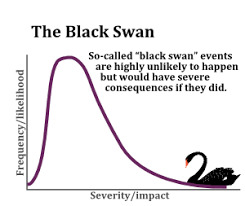Why Black Swans Are So Common
The current coronavirus pandemic has led to much talk about “black swan” events. To understand what that phrase means, realize that black swans are very common. It’s just that they are common in a place not visited much for a long time, namely, western Australia. Indeed, they are the state bird of Western Australia. It is only in Europe that swans are white. The 2nd century Roman poet Juvenal referred to something which can never happen as a black swan. The phrase was a common expression in 16th century London. But in 1697, Dutch explorers led by Willem de Vlamingh became the first Europeans to see black swans, in western Australia.
If the simplest definition of “black swans” are something thought to be impossible until it turns out they are quite common, a fuller definition is in Nassim Nicholas Taleb’s 2007 book The Black Swan. He argued that Black Swan Events have 3 attributes, “First, it is an outlier, as it lies outside the realm of regular expectations, because nothing in the past can convincingly point to its possibility. Second, it carries an extreme ‘impact’. Third, in spite of its outlier status, human nature makes us concoct explanations for its occurrence after the fact, making it explainable and predictable.”
Taleb refers to events like the disintegration of the Soviet Union and the spread of the internet as Black Swan Events. The practical aim of Taleb’s book is not to attempt to predict events which are unpredictable, but to build robustness against negative events while still exploiting positive events. He warns against overreliance on decision theory which, because it is based on a fixed model of possible outcomes, ignores the effect of events that are “outside the model”. To use an expression popularized by Bush’s Defense Secretary Donald Rumsfeld, a fixed model considers the “known unknowns” but ignores the “unknown unknowns.”
We will be lucky to see on the horizon events which will turn our world upside down. That is why we should build into any agreement the flexibility to deal with totally unexpected circumstances. The obvious clauses are about “acts of God” or wars, but any fuller agreement – for large money sums or for long periods – should have more extensive clauses, ideally about “circumstances which neither party could reasonably have foreseen.”

